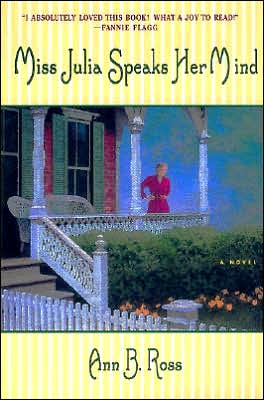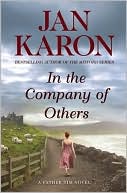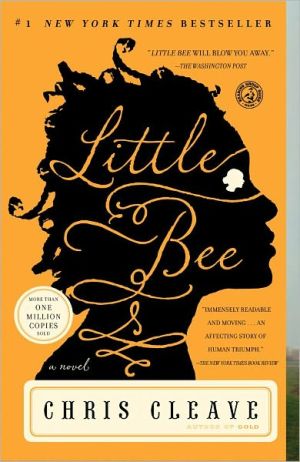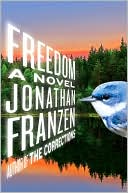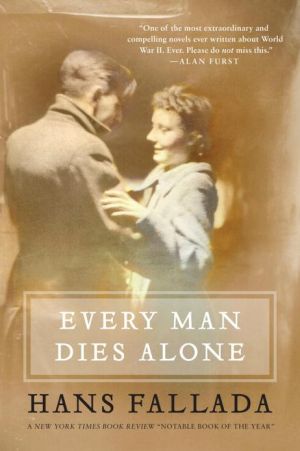Miss Julia Speaks Her Mind (Miss Julia Series #1)
Miss Julia, a recently bereaved and newly wealthy widow, is only slightly bemused when one Hazel Marie Puckett appears at her door with a youngster in tow and unceremoniously announces that the child is the bastard son of Miss Julia's late husband. Suddenly, this longtime church member and pillar of her small Southern community finds herself in the center of an unseemly scandal-and the guardian of a wan nine-year-old whose mere presence turns her life upside down.\ With razor-sharp wit and...
Search in google:
Miss Julia, a recently bereaved and newly wealthy widow, is only slightly bemused when one Hazel Marie Puckett appears at her door with a youngster in tow and unceremoniously announces that the child is the bastard son of Miss Julia's late husband. Suddenly, this longtime church member and pillar of her small Southern community finds herself in the center of an unseemly scandal-and the guardian of a wan nine-year-old whose mere presence turns her life upside down.With razor-sharp wit and perfect "Steel Magnolia" poise, Miss Julia speaks her mind indeed-about a robbery, a kidnapping, and the other disgraceful events precipitated by her husband's death. Fast-paced and charming, with a sure sense of comic drama, a cast of crazy characters, and a strong Southern cadence, Miss Julia Speaks Her Mind will delight readers from first page to last.Publishers WeeklyCharming Southern eccentrics breathe life into a predictable story of a proper Presbyterian wife ("Miss Julia") who finds her true self after the sudden death of her husband of 44 years, wealthy but parsimonious banker Wesley Lloyd Springer. Julia is becoming accustomed to the role of rich widow when another shock intrudes: Hazel Marie Puckett appears on the front porch wearing "heels too high, a dress too short, and hair too yellow," with a nine-year-old boy in tow whose "eyes were so much like Wesley Lloyd's it was like looking at her husband before she ever met him." Hazel Marie is on her way to beauty school in Raleigh, N.C., since Wesley senior left no provision for her support, and Miss Julia realizes that she must take her husband's "last legacy" into her home. Meanwhile, her inheritance attracts a variety of small-town opportunists, beginning with Pastor Ledbetter, who insinuates that her departed husband planned to leave his money to the church, then enlists the aid of "Christian psychologist" Dr. Fred Fowler to prove Miss Julia's incompetence in a court of law. Ross's characters resist their stereotypical outlines--Miss Julia's black maid, Lillian, might talk like a character from Gone with the Wind, but she provides the strategy for retrieving Little Lloyd Jr. when he's abducted by Hazel Marie's shifty uncle, Brother Vern, a televangelist who also has designs on Miss Julia's money. Miss Julia's luck turns when, ransacking the pantry for Lillian's cache of Oreos, she comes across a Winn-Dixie sack secreted by Little Lloyd, which contains a new will and testament from the dead Lloyd Sr. Along with its homespun appeal, the novel offers an interesting take on gender, race and family in the South; it's fast-paced and funny despite Ross's persistent asides to readers and reference to serious issues (the church's stance on homosexuality and abortion). In the end, Miss Julia's prim self-absorption gives way and she begins to "feel like a real person, saying what she was thinking instead of packing it down inside." Agent, Peter Miller/Delin Cormeny. Author tour. (July) Copyright 1999 Cahners Business Information.
Chapter One\ I'd just caught my breath after the shock of my husband's sudden passing when his last legacy showed up on my front porch. We'd buried Wesley Lloyd Springer some few months before that hot, still morning in August, and I hoped I was through signing forms and meeting with lawyers and shuffling through various and sundry legal papers. I declare, this business of dying has more legal aspects to it than you would think. The deceased never knows what you have to go through to get his affairs in order, and Wesley Lloyd's were in as much order as they could get. I thought.\ Lord, it was hot that morning, and I recalled again how Wesley Lloyd had always put his foot down about air-conditioning the house, even when the Conovers had theirs done. Central air, too. Wesley Lloyd said it was a waste of money and, besides, fresh air was good for us. He felt that way only at home, though, because his office at the bank was kept cool enough for the threepiece suits he wore day in and day out. But I don't believe in speaking ill of the dead, even when it's the truth.\ So I was sitting in my living room trying to get my mind off the heat by looking through a stack of mail-order catalogs. Making a list of the items I intended to call in for and having a good time doing it, since Binkie Enloe'd said I needed to spend some, money. Sam Murdoch had agreed, and he ought've known since he was the executor of the will that had put me in my present more-than-comfortable position. Lord, there was more money than I ever knew Wesley Lloyd had, and it all belonged to me, his grieving widow. But a proud widow, too, and justly so, because I'd made such a fine andfortunate choice of husbands.\ But I tell you, I thought I'd never get over the shock of finding Wesley Lloyd dead as a doornail, slumped over the steering wheel of his new Buick Park Avenue. Steel gray with plush upholstery, parked right out there in the driveway.\ But I did, laying him to rest in a properly ordered Presbyterian ceremony as he would've expected. Then I had to suffer another shock when I found out how well-off Wesley Lloyd had been. Why, besides the bank his daddy'd left him, he owned half the county, seemed like, plus stocks and bonds and tax-deferred annuities, all of it making more and more money every day of the week. When the extent of his estate was laid out for me, all I could think of was how he used to hand me a housekeeping allowance every Friday, saying, "Make it last, Julia. Money doesn't grow on trees, you know." And all the time he was cultivating a whole grove! Well, a lot of good it did him, because I ended up with every penny.\ Now, after forty-four years in blissful ignorance of Wesley Lloyd's activities, financial and otherwise, I had settled down to enjoy the benefits of widowhood and a full checkbook, both of which I was mastering with hardly any problems to speak of.\ I looked out the window as a few cars passed by on Polk Street, headed down to Main. I declare, everybody and his brother seemed to have a telephone glued to his ear, though this town's not big enough to need BellSouth whenever you drive to the grocery store. Across the street the parking lot spread from Polk to the back of the First Presbyterian Church of Abbotsville, my church and the one Wesley Lloyd and his father, before him, had supported with their presence, tithes, offerings, and over-and-above donations. Advice, too, which was always taken but not always appreciated. Heat waves shimmered up from the asphalt lot as I took note of whose cars were parked over there. It was my custom to keep up with what went on around me and, since Mondays were Pastor Ledbetter's days off, I couldn't be blamed for wondering why he was meeting with several men on the session at the church. But far be it from me to be nosy.\ I could hear Lillian humming along with the radio above the occasional clatter of pans out in the kitchen as she prepared my lunch. That was another thing that was different, now that Wesley Lloyd wouldn't be home for meals anymore. He'd liked a quiet house, meals served on time, and everything done right on schedule. I had already begun to enjoy a little freedom from that schedule, telling Lillian that we'd eat whenever either of us got hungry or she got the urge to put something on the table.\ I licked a finger and turned a page in the Neiman Marcus Christmas catalog, wondering what Sam and Binkie would say if I ordered a few trinkets from it. I declare, some of the offerings were for people with more money than sense, a condition that didn't apply to me, I'm happy to say. I expect, though, that any number of people would've said it did if they'd known the full extent of Wesley Lloyd's prudence and foresight.\ However. His prudence and foresight hadn't taken heart attacks into account. I knew as sure as I was sitting there he never intended to leave me in charge of everything he owned. I knew it as soon as Pastor Ledbetter came sidling up to me not two days after laying Wesley Lloyd to rest, telling me he knew I'd want to 'honor Mr. Springer's last wishes even if they'd never gotten written down. That was the first I'd heard that Wesley Lloyd had planned to make the First Presbyterian Church. . .\ Miss Julia Speaks Her Mind. Copyright © by Ann Ross. Reprinted by permission of HarperCollins Publishers, Inc. All rights reserved. Available now wherever books are sold.
\ Publishers Weekly - Publisher's Weekly\ Charming Southern eccentrics breathe life into a predictable story of a proper Presbyterian wife ("Miss Julia") who finds her true self after the sudden death of her husband of 44 years, wealthy but parsimonious banker Wesley Lloyd Springer. Julia is becoming accustomed to the role of rich widow when another shock intrudes: Hazel Marie Puckett appears on the front porch wearing "heels too high, a dress too short, and hair too yellow," with a nine-year-old boy in tow whose "eyes were so much like Wesley Lloyd's it was like looking at her husband before she ever met him." Hazel Marie is on her way to beauty school in Raleigh, N.C., since Wesley senior left no provision for her support, and Miss Julia realizes that she must take her husband's "last legacy" into her home. Meanwhile, her inheritance attracts a variety of small-town opportunists, beginning with Pastor Ledbetter, who insinuates that her departed husband planned to leave his money to the church, then enlists the aid of "Christian psychologist" Dr. Fred Fowler to prove Miss Julia's incompetence in a court of law. Ross's characters resist their stereotypical outlines--Miss Julia's black maid, Lillian, might talk like a character from Gone with the Wind, but she provides the strategy for retrieving Little Lloyd Jr. when he's abducted by Hazel Marie's shifty uncle, Brother Vern, a televangelist who also has designs on Miss Julia's money. Miss Julia's luck turns when, ransacking the pantry for Lillian's cache of Oreos, she comes across a Winn-Dixie sack secreted by Little Lloyd, which contains a new will and testament from the dead Lloyd Sr. Along with its homespun appeal, the novel offers an interesting take on gender, race and family in the South; it's fast-paced and funny despite Ross's persistent asides to readers and reference to serious issues (the church's stance on homosexuality and abortion). In the end, Miss Julia's prim self-absorption gives way and she begins to "feel like a real person, saying what she was thinking instead of packing it down inside." Agent, Peter Miller/Delin Cormeny. Author tour. (July) Copyright 1999 Cahners Business Information.\ \ \ \ \ Kirkus ReviewsAn apparent comedy of errors that gradually reveals itself to be a comedy of greed and calculation, by the author of The Pilgrimage (1987). Julia Springer suffered through 44 years of a woebegone marriage before she could spread her wings and emerge as her true self—a merry widow. After husband Wesley's recent death, Julia found that she'd been named his sole beneficiary. Which was a surprise, given Wesley's low opinion of Julia's financial capabilities, but not so astounding as the size of the estate itself. Now a rich woman with no domestic restraints, Julia is set to enjoy the remainder of her years in quiet style, flipping idly through the Neiman-Marcus catalogue as she expertly fends off investment bankers and begging philanthropists. One day, however, her peace is interrupted by a knock on the door: a young woman named Hazel Marie Puckett introduces herself as Wesley's longtime mistress and, before Julia has time to absorb the shock, departs, leaving her nine-year-old son Wesley Jr. on Julia's doorstep. What to make of all this? Julia contacts the police and her lawyer straightaway—and discovers to her horror that everyone in town knew about Wesley's decade-long affair. He had even set up Hazel Marie in a little house, which was not mentioned in the will and from which Hazel Marie and the boy have now been evicted. Furious, Julia decides to take her revenge the only way she knows how: by keeping the boy and acknowledging him as her husband's bastard son. But then the plot thickens. A creepy televangelist, Brother Vern, kidnaps the boy, and Julia and Hazel Marie team up to get him back. Wesley Sr.'s will wasn't so straightforward, after all. And Julia learns fromher pastor that she's something called a nymphomaniac. Is there any way out of such a mess? Good-natured entertainment, done with a sharp eye for the details of small-town southern life and domestic melodrama.\ \
